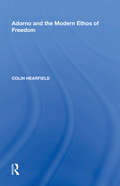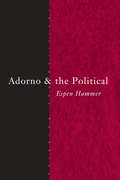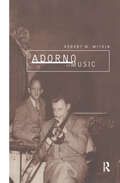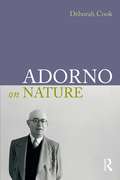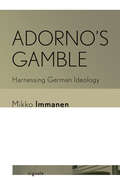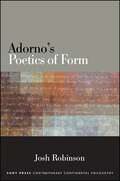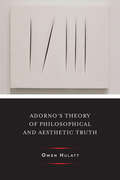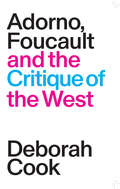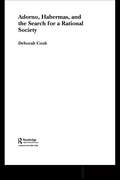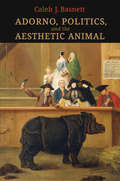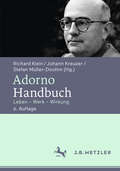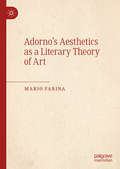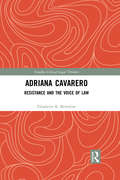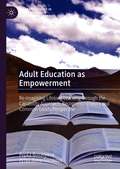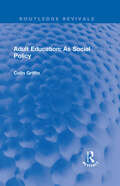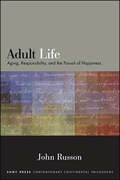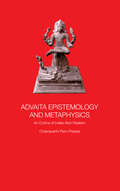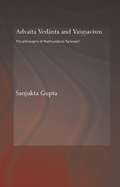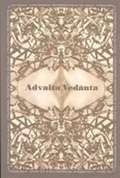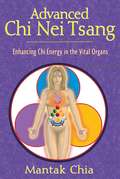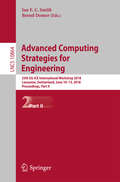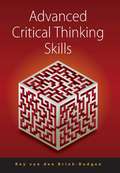- Table View
- List View
Adorno and the Modern Ethos of Freedom (Ashgate New Critical Thinking In Philosophy Ser.)
by Colin HearfieldDelivering a concise and lucid account of Adorno's response to the modern question of freedom, Hearfield sets into critical relief six other modern philosophies of freedom from Kant, Hegel, Nietzsche, Heidegger, Foucault and Habermas. The book presents a broad variety of perspectives concerning the question of freedom, and draws out the contrasting and superior merit of Adorno's response. Hearfield employs an interpretive framework that makes a distinction between a conceptual ratio (Kant, Hegel and Habermas) and an existential poiesis (Nietzsche, Heidegger and Foucault). The book includes singular reconstructions of Adorno's immanent critiques of Kant, Hegel, Nietzsche and Heidegger, and demonstrates the theoretical instabilities peculiar to Foucault and Habermas. The book concludes by revealing the respective 'blind spots' in the conceptual ratio and existential poiesis modes of thinking, which block our capacity for becoming free.
Adorno and the Political (Thinking the Political)
by Espen HammerInterest in Theodor W. Adorno continues to grow in the English-speaking world as the significance of his contribution to philosophy, social and cultural theory, as well as aesthetics is increasingly recognized. Espen Hammer’s lucid book is the first to properly analyze the political implications of his work, paying careful attention to Adorno’s work on key thinkers such as Kant, Hegel and Benjamin. Examining Adorno’s political experiences and assessing his engagement with Marxist as well as liberal theory, Hammer looks at the development of Adorno’s thought as he confronts Fascism and modern mass culture. He then analyzes the political dimension of his philosophical and aesthetic theorizing. By addressing Jürgen Habermas’s influential criticisms, he defends Adorno as a theorist of autonomy, responsibility and democratic plurality. He also discusses Adorno’s relevance to feminist and ecological thinking. As opposed to those who see Adorno as someone who relinquished the political, Hammer’s account shows his reflections to be, on the most fundamental level, politically motivated and deeply engaged. This invigorating exploration of a major political thinker is a useful introduction to his thought as a whole, and will be of interest to scholars and students in the fields of philosophy, sociology, politics and aesthetics.
Adorno on Music (International Library of Sociology)
by Robert W. WitkinAdorno is one of the leading cultural thinkers of the twentieth century. This is the first detailed account of Adorno's texts on music from a sociological perspective. In clear, non-technical language, Robert Witkin guides the reader through the complexities of Adorno's argument about the link between music and morality and between musical works and social structure. It was largely through these works Adorno established the right of the arts to be acknowledged as a moral and critical force in the development of a modern society. By recovering them for non-musicologists, Witkin adds immeasurably to our appreciation of this giant of twentieth-century thought.
Adorno on Nature
by Deborah CookDecades before the environmental movement emerged in the 1960s, Adorno condemned our destructive and self-destructive relationship to the natural world, warning of the catastrophe that may result if we continue to treat nature as an object that exists exclusively for our own benefit. "Adorno on Nature" presents the first detailed examination of the pivotal role of the idea of natural history in Adorno's work. A comparison of Adorno's concerns with those of key ecological theorists - social ecologist Murray Bookchin, ecofeminist Carolyn Merchant, and deep ecologist Arne Naess - reveals how Adorno speaks directly to many of today's most pressing environmental issues. Ending with a discussion of the philosophical conundrum of unity in diversity, "Adorno on Nature" also explores how social solidarity can be promoted as a necessary means of confronting environmental problems.
Adorno's Gamble: Harnessing German Ideology (Signale: Modern German Letters, Cultures, and Thought)
by Mikko ImmanenAdorno's Gamble offers a startling reinterpretation of the evolution of Theodor W. Adorno's thought, usually seen as a mix of critical Marxism, Freudian psychoanalysis, aesthetic modernism, and Jewish tradition. Mikko Immanen argues for another, previously unacknowledged source of Adorno's thinking on instrumental reason, dialectic of enlightenment, and frailty of democracy: the intellectual underpinnings of Germany's "conservative revolutionary" movement of the 1920s.In a dramatic reappraisal of the leading light of the Frankfurt School, Immanen follows Adorno's path of philosophical development from the late Weimar era through years in exile to the postwar period, establishing his debt to thinkers of radical conservative bent. In particular, he focuses on Adorno's enduring, and daring, effort to harness two of the most infamous works from this tradition—Oswald Spengler's Decline of the West and Ludwig Klages's The Spirit as Adversary of the Soul—and to repurpose their reactionary teachings for emancipatory ends.
Adorno's Poetics of Form (SUNY series in Contemporary Continental Philosophy)
by Josh RobinsonAdorno's Poetics of Form is the first book-length examination of the elusive deployment of the concept of form in Adorno's writings on art and literature, and the first monograph to offer a comprehensive account of the relation of these writings to his broader philosophical project. It examines form within the constellation of concepts that exist around it, considering how it appears when seen in conjunction with and in opposition to content, expression, genre, and material. Illuminated from these angles, form is revealed as the site of a complex web of dynamic conceptual interactions. The book thus offers a resolution to a problem in Adorno's work that has remained unsolved for several decades, and in doing so sets out the consequences of Adorno's poetics for literary and critical theory today.
Adorno's Practical Philosophy
by Fabian FreyenhagenAdorno notoriously asserted that there is no 'right' life in our current social world. This assertion has contributed to the widespread perception that his philosophy has no practical import or coherent ethics, and he is often accused of being too negative. Fabian Freyenhagen reconstructs and defends Adorno's practical philosophy in response to these charges. He argues that Adorno's deep pessimism about the contemporary social world is coupled with a strong optimism about human potential, and that this optimism explains his negative views about the social world, and his demand that we resist and change it. He shows that Adorno holds a substantive ethics, albeit one that is minimalist and based on a pluralist conception of the bad - a guide for living less wrongly. His incisive study does much to advance our understanding of Adorno, and is also an important intervention into current debates in moral philosophy.
Adorno's Theory of Philosophical and Aesthetic Truth (Columbia Themes in Philosophy, Social Criticism, and the Arts)
by Owen HulattIn Adorno's Theory of Philosophical and Aesthetic Truth, Owen Hulatt undertakes an original reading of Theodor W. Adorno's epistemology and its material underpinnings, deepening our understanding of his theories of truth, art, and the nonidentical. Hulatt's novel interpretation casts Adorno's theory of philosophical and aesthetic truth as substantially unified, supporting the thinker's claim that both philosophy and art are capable of being true.For Adorno, truth is produced when rhetorical "texture" combines with cognitive "performance," leading to the breakdown of concepts that mediate the experience of the consciousness. Both philosophy and art manifest these features, although philosophy enacts these conceptual issues directly, while art does so obliquely. Hulatt builds a robust argument for Adorno's claim that concepts ineluctably misconstrue their objects. He also puts the still influential thinker into conversation with Hegel, Husserl, Frazer, Sohn-Rethel, Benjamin, Strawson, Dahlhaus, Habermas, and Caillois, among many others.
Adorno, Foucault and the Critique of the West
by Deborah CookThe alliance of critical theory between Frankfurt and ParisAdorno, Foucault and the Critique of the West argues that critical theory continues to offer valuable resources for critique and contestation during this turbulent period. To assess these resources, it examines the work of two of the twentieth century's more prominent social theorists: Theodor W. Adorno and Michel Foucault. Although Adorno was situated squarely in the Marxist tradition that Foucault would occasionally challenge, Deborah Cook demonstrates that their critiques of our current predicament are complementary in important respects. Among other things, these critiques converge in their focus on the historical conditions-economic in Adorno and political in Foucault-that gave rise to the racist and authoritarian tendencies that continue to blight the West. Cook also shows that, when Adorno and Foucault plumb the economic and political forces that have shaped our identities, they offer remarkably similar answers to the perennial question: What is to be done?
Adorno, Habermas and the Search for a Rational Society (Routledge Studies in Social and Political Thought #Vol. 40)
by Deborah CookTheodor W. Adorno and Jnrgen Habermas both champion the goal of a rational society. However, they differ significantly about what this society should look like and how best to achieve it. Exploring the premises shared by both critical theorists, along with their profound disagreements about social conditions today, this book defends Adorno against Habermas' influential criticisms of his account of Western society and prospects for achieving reasonable conditions of human life. The book begins with an overview of these critical theories of Western society. Both Adorno and Habermas follow Georg Lukacs when they argue that domination consists in the reifying extension of a calculating, rationalizing form of thought to all areas of human life. Their views about reification are discussed in the second chapter. In chapter three the author explores their conflicting accounts of the historical emergence and development of the type of rationality now prevalent in the West. Since Adorno and Habermas claim to have a critical purchase on reified social life, the critical leverage of their theories is assessed in chapter four. The final chapter deals with their opposing views about what a rational society would look like, as well as their claims about the prospects for establishing such a society. Adorno, Habermas and the Search for a Rational Society will be essential reading for students and researchers of critical theory, political theory and the work of Adorno and Habermas.
Adorno, Politics, and the Aesthetic Animal
by Caleb J. BasnettBuilt upon the principle that divides and elevates humans above other animals, humanism is the cornerstone of a worldview that sanctifies inequality and threatens all animal life. Adorno, Politics, and the Aesthetic Animal analyses this state of affairs and suggests an alternative – a way for humanity to make itself into a new kind of animal. Theodor W. Adorno has been accused of leading critical theory into a blind alley, divorced from practical social and political concerns. In Adorno, Politics, and the Aesthetic Animal, Caleb J. Basnett argues that by placing the problem of the human/animal distinction at the centre of Adorno’s thought, we discover a new Adorno, one whose critique of domination is in dialogue with classic concerns of political thought forged by Aristotle, including questions of humanist political education and the role of art. Through a close reading of primary sources, Basnett identifies the principal conceptual structure entwined with the understanding of human life as antagonistic to other animals, and outlines how forms of aesthetic experience disrupt this problematic concept in favour of a reconceptualization of what we call human. His analysis displaces the centrality of the human and attempts to open up a space for its transformation, both in terms of how humans relate to each other and in how humans relate to other animals.
Adorno-Handbuch: Leben, Werk, Wirkung
by Richard Klein Johann Kreuzer Stefan Müller-DoohmDas Handbuch präsentiert den Diskussionsstand zu Werk und Wirkung Theodor W. Adornos und bietet inhaltliche wie methodische Werkzeuge für die Auseinandersetzung mit dieser für die deutschsprachigen Geistes- und Sozialwissenschaften des 20. Jahrhunderts prägenden Gestalt. Dokumentation und Bestandsaufnahme einerseits, Kritik und Neudeutung andererseits sind die Ziele eines Unternehmens, in dem es nicht um die Verbreitung einer kodifizierten Lehre geht, sondern um die Darstellung und Analyse der Problemstellungen und Denkmöglichkeiten, für die Adorno exemplarisch steht. – Zentrales Anliegen des Handbuchs ist der spezifisch interdisziplinäre Charakter des Adornoschen Philosophierens. Dessen Potential erschöpft sich nicht in fachgebundener Forschung, sondern wird in der kritischen Verschränkung von Kunst, Musik, Philosophie und den Fachwissenschaften virulent. Für schulbedingte Verengungen ist kein Platz. Die über 40 Beiträger lassen vielmehr die verschiedenen Zugangsweisen und Temperamente in der Auseinandersetzung mit Adornos Werk deutlich werden. <P><P> Für die 2. Auflage wurde das Handbuch grundlegend durchgesehen, aktualisiert und um 15 Einträge erweitert.
Adorno: Philosophy And The Possibility Of Critical Rationality (The Routledge Philosophers)
by Brian O'ConnorTheodor W. Adorno (1903-69) was one of the foremost philosophers and social theorists of the post-war period. Crucial to the development of Critical Theory, his highly original and distinctive but often difficult writings not only advance questions of fundamental philosophical significance, but provide deep-reaching analyses of literature, art, music sociology and political theory. In this comprehensive introduction, Brian O’Connor explains Adorno’s philosophy for those coming to his work for the first time, through original new lines of interpretation. Beginning with an overview of Adorno’s life and key philosophical views and influences, which contextualizes the intellectual environment in which he worked, O’Connor assesses the central elements of Adorno’s philosophy. He carefully examines Adorno’s distinctive style of analysis and shows how much of his work is a critical response to the various forms of identity thinking that have underpinned the destructive forces of modernity. He goes on to discuss the main areas of Adorno’s philosophy: social theory, the philosophy of experience, metaphysics, morality and aesthetics; setting out detailed accounts of Adorno’s notions of the dialectic of Enlightenment, reification, totality, mediation, identity, nonidentity, experience, negative dialectics, immanence, freedom, autonomy, imitation and autonomy in art. The final chapter considers Adorno’s philosophical legacy and importance today. Including a chronology, glossary, chapter summaries, and suggestions for further reading, Adorno is an ideal introduction to this demanding but important thinker, and essential reading for students of philosophy, literature, sociology and cultural studies.
Adorno’s Aesthetics as a Literary Theory of Art
by Mario FarinaThis book re-examines Adorno’s aesthetics, developing a new literary approach that aims to unveil hidden elements of Adorno’s thought. Farina proposes to read Adorno’s aesthetics as a literary theory of art, showing its efficacy in its comprehension of the most advanced trends of contemporary literature. As a result, this book provides an image of Adorno’s aesthetics as a complete, satisfying and consistent philosophy of literature, a robust theory which is able to stand its ground in contemporary aesthetic debate. Challenging the prevalent prejudice that defines Adorno’s thought, and especially his aesthetics, as ‘modernist’, Farina argues that Adorno's philosophy of literature shows its value precisely in its application to and comprehension of postmodern literature, such as the works of Thomas Pynchon, Don DeLillo and David Foster Wallace. Precise and compelling, this book provides a new paradigm for understanding Adorno’s theory of artwork, serving as an essential reference for researches investigating the relation between classical critical theory and contemporary art.
Adorno’s Modernism
by Espen HammerTheodor W. Adorno's aesthetics has dominated discussions about art and aesthetic modernism since World War II, and continues to inform contemporary theorizing. Situating Adorno's aesthetic theory in the context of post-Kantian European philosophy, Espen Hammer explores Adorno's critical view of art as engaged in reconsidering fundamental features of our relation to nature and reality. His book is structured around what Adorno regarded as the contemporary aesthetician's overarching task: to achieve a vision of the fate of art in the modern world, while demonstrating its unique cognitive potential. Hammer offers a lively examination of Adorno's work through the central problem of what full human self-actualization would require, and also discusses the wider philosophical significance of aesthetic modernism. This book will be a valuable resource for scholars and students of social philosophy, art, and aesthetics.
Adriana Cavarero: Resistance and the Voice of Law (Nomikoi: Critical Legal Thinkers)
by Elisabetta R. BertolinoCritical legal scholars have made us aware that law is made up not only of rules but also of language. But who speaks the language of law? And can one lawfully speak in one’s voice? For the Italian philosopher Adriana Cavarero, to answer these questions we must not separate who is speaking from the very act of speaking; moreover, we must recuperate the material singularity and relationality of the mouth that speaks. Drawing on Cavarero’s work, this book focuses on the potentiality of the voice for resisting law’s sovereign structures. For Cavarero, it is the voice that expresses one’s living and unrepeatable singularity in a way that cannot be subsumed by the universalities and standards of law. The voice is essentially a material and singular passage of air and vibration that necessarily reveals one’s uniqueness in relationality. Speaking discloses this uniqueness, and so one’s vulnerability. It therefore leads to possibilities of resistance that, here, bring a fresh approach to longstanding legal theoretical concerns with singularity, ethics and justice.
Adult Education as Empowerment: Re-imagining Lifelong Learning through the Capability Approach, Recognition Theory and Common Goods Perspective (Palgrave Studies in Adult Education and Lifelong Learning)
by Pepka Boyadjieva Petya Ilieva-TrichkovaThis book re-imagines the essence and role of adult education at both the individual and societal levels. It provides arguments for understanding adult education as a process of agency and empowerment, which has not only instrumental but intrinsic and transformative roles to play. This book brings together ideas from the capability approach with insights from recognition theory; the embeddedness approach; the political economic perspective for understanding public and private goods and the common goods perspective. The analysis draws on data from large-scale international studies – alongside qualitative data - and adopts a wide-ranging European comparative perspective. The book develops original instruments for measuring different dimensions of adult education as a common good, and its realisation in different social contexts. It is aimed at academics, students, practitioners, and policy makers interested in adult and/or higher education and the social justice perspective to human life.
Adult Education: As Social Policy (Routledge Revivals)
by Colin GriffinFirst published in 1987, Adult Education: As Social Policy intends to provide an introduction to the social policy analysis of adult education, contributing to the larger literature around lifelong or continuing education. The roots of policy in alternative social welfare models are traced to their ideological sources and to the origins of adult education theory itself. The development of professionalism is also considered in relation to policy analysis and there is a case study of major policy documents to illustrate the analysis. The book will be of interest to students of pedagogy, education, and policy.
Adult Life: Aging, Responsibility, and the Pursuit of Happiness (SUNY series in Contemporary Continental Philosophy)
by John RussonWhat does it mean to be an adult? In this original and compelling work, John Russon answers that question by leading us through a series of rich reflections on the psychological and social dimensions of adulthood and by exploring some of the deepest ethical and existential issues that confront human life: intimacy, responsibility, aging, and death. Using his knowledge of the history of philosophy along with the combined resources of psychology, sociology, and anthropology, he explores the behavioral challenges of becoming an adult and examines the intimate relationships that are integral to healthy development. He also studies our experiences of time and space, which address both aging and the crucial role that our material environments play in the formation of our personalities. Of special note is Russon's provocative assessment of the economic and political contexts of contemporary adult life and the distinctive problems they pose. Engaging and accessible, Adult Life is for anyone seeking the profound lessons our human culture has learned about living well.
Advaita Epistemology and Metaphysics: An Outline of Indian Non-Realism
by Chakravarthi Ram-PrasadBased on original translations of passages from the works of three major thinkers of the classical Indian school of Advaita (Sankara, Vacaspati and Sri Harsa), but addressing issues found in Descartes, Berkeley, Hume, Kant, Wittgenstein and contemporary analytic philosophers, this book argues for a philosophical position it calls 'non-realism'. This is the view that an independent, external world must be assumed if the features of cognition are to be explained, but that it cannot be proved that there is such a world, independently of an appeal to cognition itself. This position is constructed against idealist denials of externality, realist arguments for an independent world and the sceptical denial of the coherence of cognition.
Advaita Vedanta and Vaisnavism: The Philosophy of Madhusudana Sarasvati (Routledge Hindu Studies Series)
by Sanjukta GuptaIn Indian philosophy and theology, the ideology of Vedanta occupies an important position. Hindu religious sects accept the Vedantic soteriology, which believes that there is only one conscious reality, Brahman from which the entire creation, both conscious and non-conscious, emanated. Madhusudana Sarasvati, who lived in sixteenth century Bengal and wrote in Sanskrit, was the last great thinker among the Indian philosophers of Vedanta. During his time, Hindu sectarians, rejected monistic Vedanta. Although a strict monist, Madhusudana tried to make a synthesis between his monistic philosophy and his theology of emotional love for God. Sanjukta Gupta provides the only comprehensive study of Madhusudana Sarasvati's thought. She explores the religious context of his extensive and difficult works, offering invaluable insights into Indian philosophy and theology.
Advaita Vedanta: A Philosophical Reconstruction
by Eliot DeutschAn introduction to the several systems of classical Indian thought such as Professor Deutsch provides.
Advanced Chi Nei Tsang: Enhancing Chi Energy in the Vital Organs
by Mantak ChiaAdvanced Taoist techniques for detoxifying and rejuvenating the internal organs through the release of negative chi • Works with the navel center, where negative emotions, stress, and illness accumulate • Presents advanced techniques to release negative energy from the body and reestablish a healthy flow of vital energy to internal tissues and organs From the Taoist point of view, good health depends upon the free flow of chi--healthy life-force energy--throughout the body. Taoists refer to healthy chi as good wind. When energy is trapped in the body it stagnates and becomes negative, manifesting in the symptoms of physical or emotional illness. Taoists call this negative energy sick or evil wind. The advanced Chi Nei Tsang practices focus on mastering these winds. They include techniques for developing sensitivity to sick winds, releasing internal energy blockages, and chasing sick winds from the body to reestablish a healthy flow of energy. Negative energies caused by stress, tension, and the effects of past illnesses tend to accumulate in the naval center, so the advanced Chi Nei Tsang techniques use elbow pressure on specific reflex points around the navel to release energy blockages associated with each internal organ. They also work with wind access points found near the standard acupuncture points. These advanced practices build upon the organ detoxification and rejuvenation practices introduced in Chi Nei Tsang, allowing the practitioner to work intensively at an energetic level toward the restoration of optimum health and well-being.
Advanced Computing Strategies for Engineering: 25th EG-ICE International Workshop 2018, Lausanne, Switzerland, June 10-13, 2018, Proceedings, Part II (Lecture Notes in Computer Science #10864)
by Ian F. Smith Bernd DomerThis double volume set ( LNAI 10863-10864) constitutes the refereed proceedings of the 25th International Workshop, EG-ICE 2018, held in Lausanne, Switzerland, in June 2018. The 58 papers presented in this volume were carefully reviewed and selected from 108 submissions. The papers are organized in topical sections on Advanced Computing in Engineering, Computer Supported Construction Management, Life-Cycle Design Support, Monitoring and Control Algorithms in Engineering, and BIM and Engineering Ontologies.
Advanced Critical Thinking Skills
by Roy Van Den Brink-BudgenThis book takes the skills introduced in Roy van den Brink-Budgen's bestselling book Critical Thinking for Students and extends and builds on them. As a result, it will be especially useful for students on advanced level courses, whether in schools, colleges, or universities. It shows how complex arguments can be built up, analysed, and evaluated. It also shows how the use of various types of claim can be approached in argument, by stressing the need to ask a series of questions about their possible significance. The frequent role of explanation in the drawing of inference is also detailed. In addition, it applies Critical Thinking skills to decision-making, showing how these skills can clarify the choices available, their possible consequences, and the criteria needed to make decisions. In short, this book shows how to become an even more active and effective Critical Thinker.
